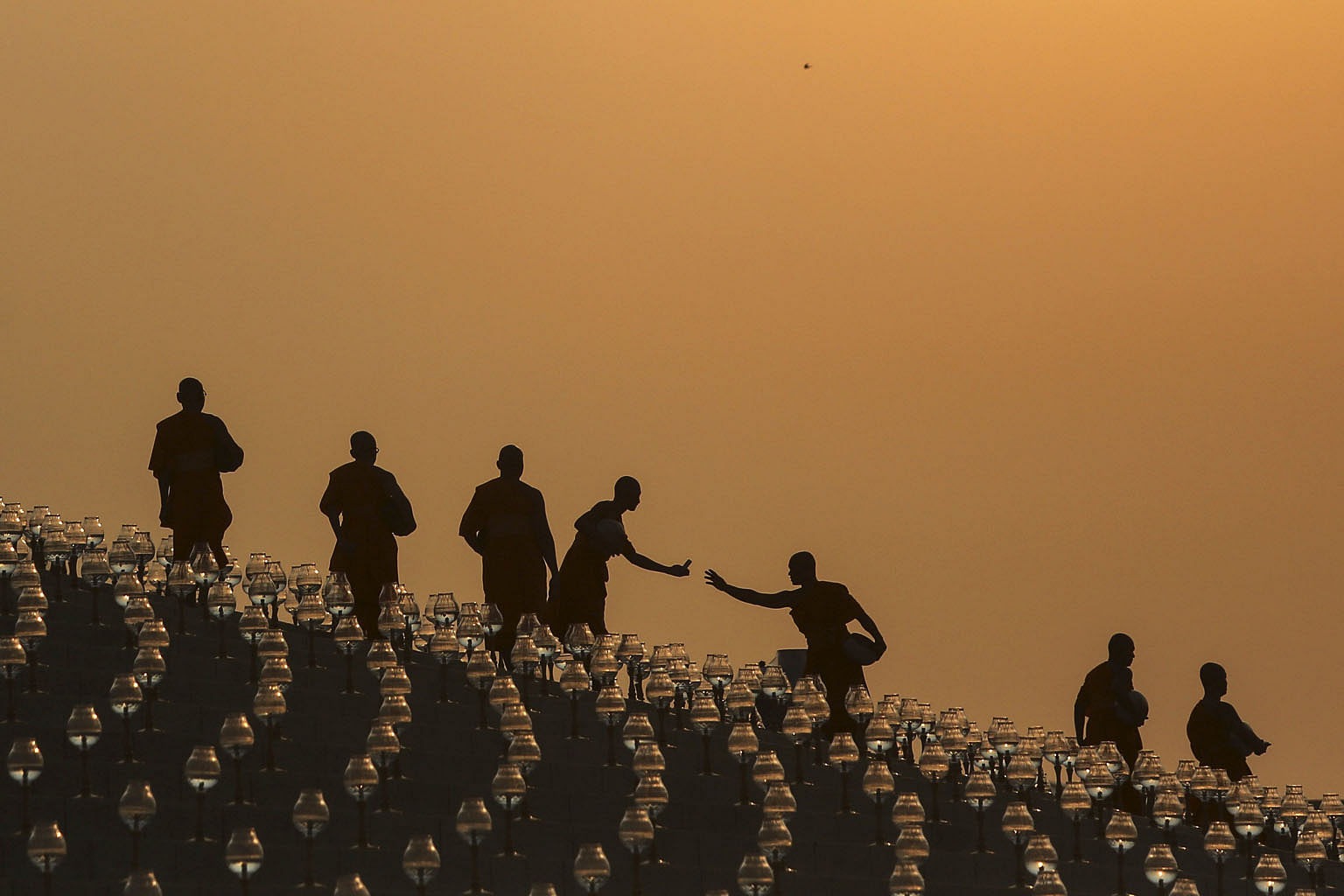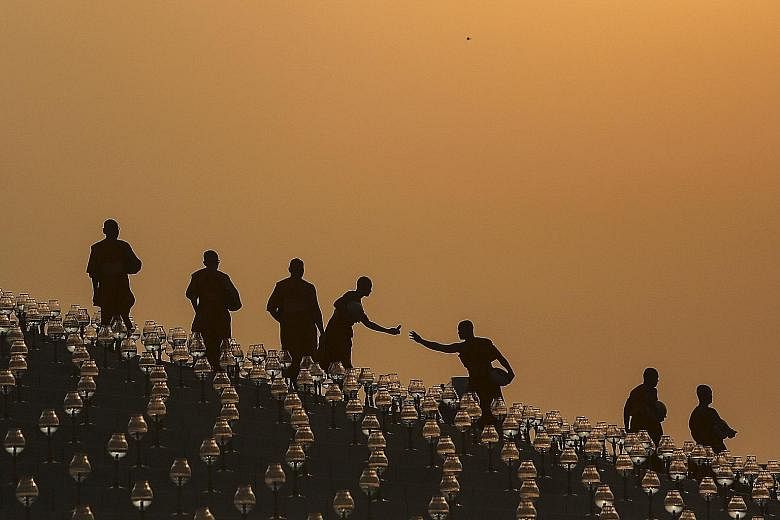Making a mockery of Buddhism
Tulsathit Taptim
The Nation, Thailand
There's no use debating why a "religious" matter like appointinga new Supreme Patriarch has become deeply politicised.
In the name of religion, anything is possible - violence, random killings, invasions, wars, repression, you name it. Even one of the supposedly most peaceful religions on earth, Buddhism,is no exception.
My intent here is not to deplore the politicisation of the quest fora new Sangha leader.
What I want to know is how Buddhism in Thailand, which proudly considers itself a havenof the "true dharma", has shifted from "detachment" to absolute selfish intolerance.
On display in the ongoing showdown between supporters of different candidates for the country's top ecclesiastic post is almost everything that was renounced by Lord Buddha.

Are we a "Buddhist" nation,or simply a country full ofclueless acolytes?
Let's take a look at the Supreme Patriarch controversy in relation to Buddhism's core principles.
First, we have "detachment".The doctrine stemmed fromthe Buddha's fundamental belief that nothing belongs to us, leastof all the titles bestowed by society or religion.
Are you practising detachment by threatening turmoil if your preferred choice for Supreme Patriarch is rejected?
The next doctrine is the"middle path".
Lord Buddha discouraged his followers from taking up extreme or fanatical positions.
Have the different camps taken the middle path in setting a collision course over the Supreme Patriarch affair? You tell me.
Then we have the Noble Truths of "suffering and its causes".
Love, greed, anger and lust are surefire ways, Buddhists are warned, of becoming stuck in the cycle of worldly misery. In other words, they are detachment's greatest enemies.
While non-Buddhists mightbaulk at the notion of "love" asan obstacle to enlightenment (although the Buddha was likely not referring to love in its truest, ultimate form), it has playedno part in the current confrontation anyway.
The other three causes,however, are dictating the course of the controversy.
Another decidedly un-Buddhist trait on display in the Supreme Patriarch fiasco is perhaps not given a name in Lord Buddha's teachings.
It's the urge to control, to suppress others, and to be omnipotent. It's the opposite of selflessness. What we are witnessing is vanity running amok.
Genuine Buddhism has never been about control or domination.
While Buddhists do organise their clergy by rank, becoming so obsessed with rank, as is the case in Thailand at the moment, goes against everything Lord Buddha stood for.
Halal this side, non-halal that side
Tay Tian Yan
Sin Chew Daily, Malaysia
Recently, we have our first halal airline Riyani Air, with their crew members draped in tudung and uniforms that cover most parts of their bodies.
And as the airline is halal, the uniforms of the crew should not be the only thing that must meet the halal requirements. If you were to fly Riyani Air some day, be sure you do not ask for liquor to be served.
Perhaps a prayer has to be said just before take-off!
And now, we also want to have trolleys that are halal certified.So pick the right one the next time you visit a hypermarket.
The problem is, how is the business owner going to tell whether a customer is a Muslimor non-Muslim?
What if I use the wrong trolley? Do I have to pay an additional 5 per cent for trolley cleaning? Now that we have non-halal trolleys, does it mean our pet dogs can take a ride in one of them?
These issues need tobe hammered out bysupermarket operators andthe religious department.
Even as the owners of the airline and hypermarket go halal on their own accord, not under any pressure, I have a feeling that, very soon, the authorities will suggest inscribing halal/non-halal trolley regulations on business licences.
By the way, these two bosses are non-Muslims themselves, one Indian and the other Chinese. I am pretty certain they are doing this not to promote the Islamic faith.
As the Malay community becomes increasingly attached to its religious affiliation, the demand for halal certification will only get stronger by the day. To sharp-witted businessmen, all they smell is a business opportunity.
Who knows? One day, our malls will have separate halal and non-halal sections. The same goes for cinemas, schools, government departments, election candidates and what not.
A 'normal religion' in the past
Jawed Naqvi
The Dawn, Pakistan
Before everyone started tiptoeing around everyone's religion for fear of causing offence, there was humour that burst forth from within everyone's social crevices.
Sikh jokes were shared primarily by Sikhs, preferably with their non-Sikh friends. The more creative Hindu boys in my Lucknow neighbourhood wrote outrageously funny, even scandalous, versions of the Ramayana in the Awadhi dialect that would make Goswami Tulsidas sit up.
Lucknow's Shi'ite-Sunni banter was legendary before the joke went sour. Sunnis were machchar or mosquitoes for the Shi'ites and they, in turn, for whatever reason, were assigned the sobriquet of khatmal, or bedbugs.
The tussle between social impositions rooted in religion and uncompromising men and women who seek to reject such edicts is perhaps as old as religion itself.
There is room for improvement, with or without the humour. In a more contemporary if sombre context, before they slaughter the next innocent Christian or Jew over his or her faith, the marauders of the militant Islamic State in Iraq and Syria group might consider Ms Rachel Corrie's death - which spoke of selfless camaraderie with the downtrodden - that the religious zealots (themselves) are not capable of. The American defied an Israeli bulldozer that was wreaking havoc on the Palestinians - her friends - and was mowed down. An ideal Palestine-Israel of Ms Corrie's dream would be a nation in which Jews, Christians and Muslims ...lived together with equal rights and unwavering fellowship.
Religion reveals itself in kaleidoscopic patterns.
•The View From Asia is a weekly compilation of articles from The Straits Times' media partner Asia News Network, a grouping of 22 newspapers. See www.asianews.network for more.

